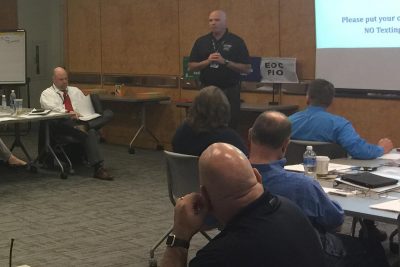Do you know what to do in an emergency? Chances are, you don’t have the level of preparedness Bryan Gran has. Bryan joined UConn Health as our emergency management program specialist in December and oversees our emergency operations planning and programs to ready us to respond to hazards and emergencies. It’s a serious task for a serious man with a serious background that includes decades of service first in the military and then in the Connecticut Department of Emergency Management and Homeland Security.

You come with an impressive background. How has your experience shaped you into who you are today?
I have to say, first and foremost, that my experiences as a husband and father have shaped me into what I am today. Without my wife, Carol, of 35 years by my side I would not be where I am today both personally and professionally. I have spent my life in service starting with the military which I joined in 1981, at the age of 18. Through my 32 years of military service I saw the roles and missions of the military change from a Cold War emphasis to counter insurgency, nation building and now to the global war on terror. When September 11, 2001, happened, everything changed. As a member of the Connecticut National Guard our mission was immediately focused on the home front and homeland security; securing key infrastructure and protecting the citizens of Connecticut. Hurricane Katrina hit in 2005 and our mission scope included supporting emergency management efforts, something that has continued through hurricane Sandy and numerous other storms and hazards. For me it’s about the desire to protect and serve; my family, my country, the citizens of Connecticut and now UConn Health.
What is the most common step most of us could take to make us better prepared for an emergency?
Preparedness starts with you, the individual. First, when disaster strikes you may not be with your family so have a plan. Your plan should include communication methods, contact rosters, emergency meeting locations, medical information, transportation plans and other key information that will assist you and your families in times of disaster. Having a plan will also help you concentrate on your own safety if you are not at home but at work and active in life saving response operations. Second, make a kit. There is no standard for kits but there are a few things to consider including medications, flashlights, batteries, meals ready to eat, water, first aid kits, whistles, matches, personal sanitation items, seasonal clothing, maps, cell phone chargers, identification, passports, etc. Third, be aware of your environment and surroundings and get involved, so if you “See Something Say Something” and get involved at home and at work. Talk to your family, friends, neighbors and coworkers about what to do in disasters.

Bryan Gran
Favorite movie
“Black Hawk Down”
Favorite vacation spot
Lake Champlain, Vermont, for fishing
Paris for the food, history and art
Favorite delicacy
Foie gras and smoked beef brisket
Something about you today that your younger self would never believe
I’m a grandfather, and I like Broadway
Favorite sports
Fishing, hunting and shooting
Why are drills/exercises so important?
Training and exercises (drills are a form of exercise) are important to everything we do, especially when it comes to emergencies. Training teaches us what to do while exercises help us practice what we learned. The more we train and exercise the more proficient we become and the more our actions become second nature and instinctive, allowing us to react quickly and effectively in a disaster. The Emergency Management Preparedness Cycle sums it up; plan, organize, train, exercise, evaluate and improve….and then do it again.
What are some questions we should ask ourselves in the name of emergency preparedness?
What is your role in your departments emergency action plan? Do you know two ways out of the building you’re in? Where will your assembly area be? Do you know how to get there? What if you have to leave campus, where will you go? Take a few minutes and talk to your family and coworkers about what you would do during an evacuation, a lockdown or if you received a notification to shelter in place. It only takes a few minutes and can save lives.
Do you have a not-so-serious side? What’s something you enjoy doing that’s not work-related?
No, not really, or not at least until I became a grandfather – where I act like a kid with excitement when I am around my one-year-old granddaughter Maggie.